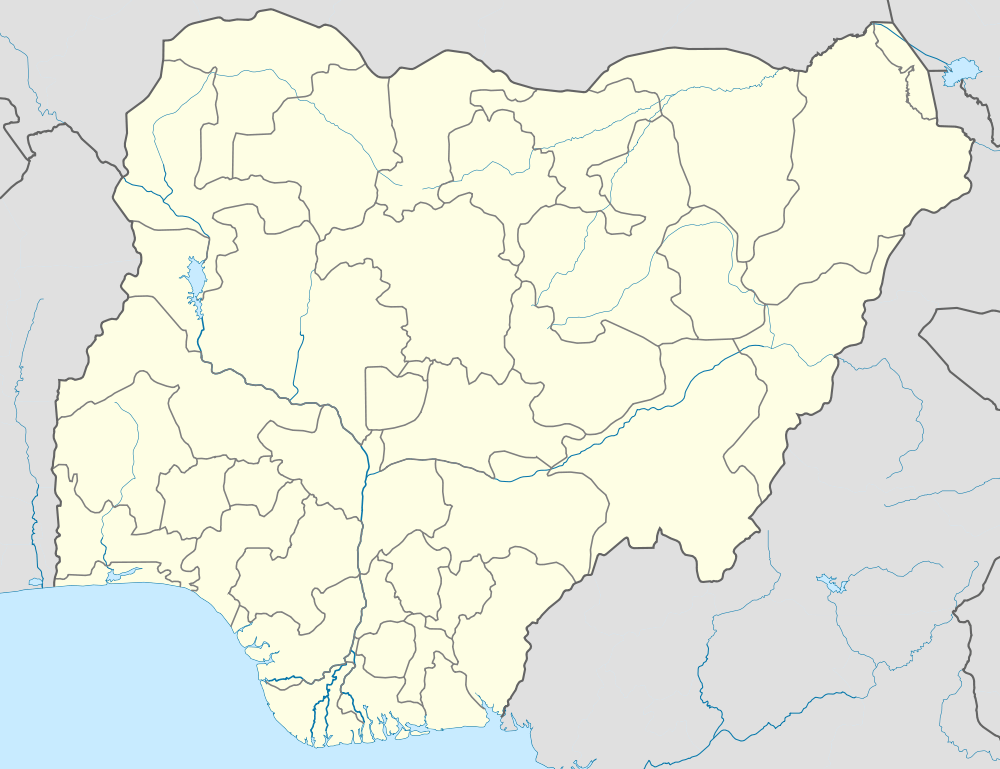Agbor
| Agbor Agbon | |
|---|---|
| Town | |
 Agbor | |
| Coordinates: 6°15′9.93″N 6°11′58.79″E / 6.2527583°N 6.1996639°ECoordinates: 6°15′9.93″N 6°11′58.79″E / 6.2527583°N 6.1996639°E | |
| Country |
|
| LGA | Ika South |
| Government | |
| • Obi | Benjamin Ikechuku, Keagborekuzi I |
| Demonym | Onye Agbor |
| Time zone | WAT (UTC+1) |
| Postcode | 321... |
| Area code(s) | 055 |
Agbor is an Igbo town in Delta state, Nigeria. The indigenes of Agbor town are of Ika descent, an Igbo-speaking group with some Bini influence. The people of Agbor were affiliated with the Kingdom of Nri and may have been founded by settlers from there; the Nze na Ozo titles exist among them as well as other Nri cultural connections.[1] The people of Agbor have traditionally relied on farming and fishing for their food and commerce. Its history is dominated by the many warriors it has produced. Agbor was once affiliated with the Benin Empire before the British conquered Benin, although the idea of Agbor being a colony of Benin is disputed.[2]
According to Mr. Egwabor Iduwe, oral tradition says that “Ogele was the patriarch of the earliest native inhabitants of Agbor land.” Mr. Iduuwe elaborates, “Ika was Ogele’s wife the first lady of our land to whom we owe the dialect we speak as the mother tongue. Her four children were named Eke, Orie, Afo and Nkwo, traditionally immortalized as the names of the four market days in the native four day week.”[3]
“We believe we belong to the Igbo family of people because our language and custom are very similar.”[4]
“Among the ancestors was a man named Nze who we are told founded the spot of Imeobi he named “Agbor” which means a family citadel” [5]
The traditional ruler of Agbor is known as Eze or Obi. The current Obi of Agbor is Benjamin Ikechuku, Keagborekuzi I who goes by Dein, the name of his ruling house,[6] instead of Obi.[7] Dein is an Igbo word traditionally used to address older men as a mark of respect. Dein is the dialectal variant of "De" and "Deede" used in other Igbo areas. In Agbor and in many other Igbo communities, the word "Dein" evolved to become a revered title for the oldest man in the community, and by implication, a title meaning the leader of the community. In many areas of Igboland, Umude or Umudei or Umudein means the lineage that produces the King, that is the descendants of the King. Umudei is the same as Umueze, Umuezeala, and Umuezeora.
References
- ↑ Onwuejeogwu, M. Angulu (1981). An Igbo civilization: Nri kingdom & hegemony. Ethnographica. p. 30. ISBN 978-123-105-X.
- ↑ Okpewho, Isidore (1998). Once upon a kingdom: myth, hegemony, and identity. Indiana University Press. p. 177. ISBN 0-253-21189-1.
- ↑ Iduwe, Egwabor (1940). History Of Greater Agbor. Victor Manfredi. p. 14.
- ↑ Iduwe, Egwabor (1940). History Of Greater Agbor. Victor Manfredi. p. 81.
- ↑ Iduwe, Egwabor (1940). History Of Greater Agbor. Victor Manfredi. p. 81.
- ↑ Ahiante, Andrew. "A Royal Father's Development Drive for His Kingdom". Thisday online.
- ↑ Enyinnaya, Buchy (August 14, 2007). "Unique king of Agbor". onlinenigeria.